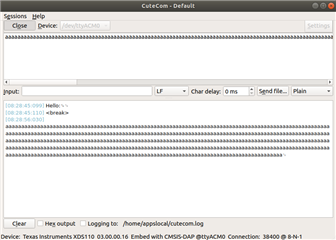Other Parts Discussed in Thread: CC1350,
I need to receive a data stream over UART in callback mode and I need to store the stream in buffer entities of 26 bytes. Thus I have used partial return mode. It usually works for messages below 128 bytes, but above it does not work in most of the cases. Sometimes I can receive up to 192 bytes, sometimes I even got 256, but most of the time, I can only receive 128 bytes.
I have created a minimal test application.
- Import the uartEcho example from SDK 4.10.01 (you can use TIRTOS, NoRTOS, it doesn't matter)
- Replace the attached uartecho.c file
- Configure the serial port to 38400 (or change the baudrate in the example accordingly, the baudrate doesn't really matter)
- Send a long message from a terminal in one go, for instance 300 bytes long. It is important to send it as a single message. As soon as there is a pause in between, the mcu receives more bytes.
- Halt the application after sending the message and check the bytesReceived variable.
Could you help me to find out what causes the problem?
Thanks
/*
* Copyright (c) 2015-2019, Texas Instruments Incorporated
* All rights reserved.
*
* Redistribution and use in source and binary forms, with or without
* modification, are permitted provided that the following conditions
* are met:
*
* * Redistributions of source code must retain the above copyright
* notice, this list of conditions and the following disclaimer.
*
* * Redistributions in binary form must reproduce the above copyright
* notice, this list of conditions and the following disclaimer in the
* documentation and/or other materials provided with the distribution.
*
* * Neither the name of Texas Instruments Incorporated nor the names of
* its contributors may be used to endorse or promote products derived
* from this software without specific prior written permission.
*
* THIS SOFTWARE IS PROVIDED BY THE COPYRIGHT HOLDERS AND CONTRIBUTORS "AS IS"
* AND ANY EXPRESS OR IMPLIED WARRANTIES, INCLUDING, BUT NOT LIMITED TO,
* THE IMPLIED WARRANTIES OF MERCHANTABILITY AND FITNESS FOR A PARTICULAR
* PURPOSE ARE DISCLAIMED. IN NO EVENT SHALL THE COPYRIGHT OWNER OR
* CONTRIBUTORS BE LIABLE FOR ANY DIRECT, INDIRECT, INCIDENTAL, SPECIAL,
* EXEMPLARY, OR CONSEQUENTIAL DAMAGES (INCLUDING, BUT NOT LIMITED TO,
* PROCUREMENT OF SUBSTITUTE GOODS OR SERVICES; LOSS OF USE, DATA, OR PROFITS;
* OR BUSINESS INTERRUPTION) HOWEVER CAUSED AND ON ANY THEORY OF LIABILITY,
* WHETHER IN CONTRACT, STRICT LIABILITY, OR TORT (INCLUDING NEGLIGENCE OR
* OTHERWISE) ARISING IN ANY WAY OUT OF THE USE OF THIS SOFTWARE,
* EVEN IF ADVISED OF THE POSSIBILITY OF SUCH DAMAGE.
*/
/*
* ======== uartecho.c ========
*/
#include <stdint.h>
#include <stddef.h>
/* Driver Header files */
#include <ti/drivers/GPIO.h>
#include <ti/drivers/UART.h>
#include <ti/drivers/uart/UARTCC26XX.h>
/* Example/Board Header files */
#include "Board.h"
uint8_t data[1024];
uint32_t bytesReceived;
void uartReadCallback(UART_Handle handle, void *buffer, size_t num)
{
bytesReceived += num;
UART_read(handle, &data, 26);
}
/*
* ======== mainThread ========
*/
void *mainThread(void *arg0)
{
char input;
const char echoPrompt[] = "Echoing characters:\r\n";
UART_Handle uart;
UART_Params uartParams;
/* Call driver init functions */
GPIO_init();
UART_init();
/* Configure the LED pin */
GPIO_setConfig(Board_GPIO_LED0, GPIO_CFG_OUT_STD | GPIO_CFG_OUT_LOW);
/* Turn on user LED */
GPIO_write(Board_GPIO_LED0, Board_GPIO_LED_ON);
UART_Params_init(&uartParams);
uartParams.baudRate = 38400;
uartParams.readDataMode = UART_DATA_BINARY;
uartParams.readMode = UART_MODE_CALLBACK;
uartParams.readCallback = &uartReadCallback;
uartParams.readEcho = UART_ECHO_OFF;
uartParams.readReturnMode = UART_RETURN_FULL;
uart = UART_open(Board_UART0, &uartParams);
UART_control(uart, UARTCC26XX_CMD_RETURN_PARTIAL_ENABLE, NULL);
UART_read(uart, &data, 26);
if (uart == NULL) {
/* UART_open() failed */
while (1);
}
while (1) {
usleep(10000);
}
}


